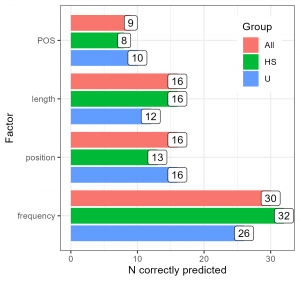Lew, Robert, & Tomczak, Ewa. (2022). Where should English dictionaries place multi-word expressions? A study of user consultation behaviour. 3L: Language, Linguistics, Literature, 28(3), 69-83. doi:10.17576/3L-2022-2803-05
Multi-word expressions (MWEs) are sequences of words that hold a single, cohesive meaning. They present difficulties to language learners who tend to associate a single word with a single unit of meaning, and that expectation is broken. When faced with comprehension problems, learners may think that one particular word is the problem. Dictionaries need to rise to that challenge by covering multi-word expressions in such cases which dictionary users may recognize.
The study described here aimed to identify factors influencing students' choices of words to look up when facing difficult expressions. Four factors were considered: lexical frequency, part of speech, position in the MWE, and word length. The study involved two groups of Polish learners of English: higher-proficiency English majors, and lower-level secondary students. The researchers analysed their choices to identify patterns and preferences when faced with semantically challenging MWEs.
The results showed that lexical frequency was the most significant factor in predicting students' choices, with both groups of learners favouring less common words as top candidates for look-up. Word length and position in the MWE were secondary factors, while part of speech proved to be the least predictive factor.
In terms of how multi-word expressions should be presented in dictionaries, the study found that allowing treatment under two headwords in cases where two infrequent component words are present is a good lexicographic policy. This recommendation is particularly relevant for print dictionaries, where space is limited and avoiding duplication of information is crucial. Digital dictionaries offer more flexibility, as cross-referencing can be implemented as hyperlinks at a much lower cost to users.
Despite the advantages of digital dictionaries, the issue of MWE placement remains relevant. Display space is limited on smaller screens, such as smartphone dictionary apps, making readability a priority. The authors also checked to what extent the placement of MWE’s in five leading dictionaries for learners of English corresponds to the findings and found much room for improvement. By applying the insights from this study, lexicographers can better serve language learners by optimizing the placement of MWEs in both print and digital dictionaries, making the process of looking up these expressions more efficient and user-friendly.
